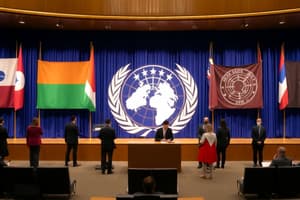Podcast
Questions and Answers
What was the deal struck by the U.S. and USSR regarding the admission of new states in 1955?
What was the deal struck by the U.S. and USSR regarding the admission of new states in 1955?
- Individual admission of states
- Creation of a new organization
- Withdrawal of existing members
- En bloc admission of 16 states (correct)
Suspension of membership rights in an international organization frees member states from their obligations.
Suspension of membership rights in an international organization frees member states from their obligations.
False (B)
What type of legal personality do international organizations possess according to the ICJ ‘Reparations’ advisory opinion?
What type of legal personality do international organizations possess according to the ICJ ‘Reparations’ advisory opinion?
International legal personality
The UN can suspend membership rights of member states as outlined in Article __ of the UN Charter.
The UN can suspend membership rights of member states as outlined in Article __ of the UN Charter.
Match the following international organization with its respective function or power:
Match the following international organization with its respective function or power:
What does the principle of speciality refer to in the context of international organizations?
What does the principle of speciality refer to in the context of international organizations?
The presumption of the legality of international organizations’ acts means all their actions are automatically valid.
The presumption of the legality of international organizations’ acts means all their actions are automatically valid.
What is 'auto-interpretation' in relation to international organizations?
What is 'auto-interpretation' in relation to international organizations?
The UN is considered an __________ legal person with the capacity to exercise significant powers.
The UN is considered an __________ legal person with the capacity to exercise significant powers.
Match the terms with their correct descriptions:
Match the terms with their correct descriptions:
What is an indispensable element for the UN to achieve its purposes?
What is an indispensable element for the UN to achieve its purposes?
International Organizations (IOs) have general competence similar to states.
International Organizations (IOs) have general competence similar to states.
What do the powers of an International Organization depend on?
What do the powers of an International Organization depend on?
An International Organization's powers are limited to those necessary for __________ its functions as defined by its foundational documents.
An International Organization's powers are limited to those necessary for __________ its functions as defined by its foundational documents.
Match the following concepts with their descriptions:
Match the following concepts with their descriptions:
According to the content, what is a key criticism of the ICJ's reasoning regarding powers of IOs?
According to the content, what is a key criticism of the ICJ's reasoning regarding powers of IOs?
What does the acronym ICJ stand for?
What does the acronym ICJ stand for?
What role does the judicial organ of an International Organization (IO) often play?
What role does the judicial organ of an International Organization (IO) often play?
Implied powers of an International Organization can change its constituent instrument.
Implied powers of an International Organization can change its constituent instrument.
What are implied powers in the context of International Organizations?
What are implied powers in the context of International Organizations?
The organization must be deemed to have powers that are _____ implied by the necessity to perform its duties.
The organization must be deemed to have powers that are _____ implied by the necessity to perform its duties.
Match the following concepts related to International Organizations:
Match the following concepts related to International Organizations:
According to the ICJ, implied powers are conferred upon the IO by _____ implication.
According to the ICJ, implied powers are conferred upon the IO by _____ implication.
Founders of an IO can foresee all actions the organization will need to take.
Founders of an IO can foresee all actions the organization will need to take.
What is one limitation of implied powers for an International Organization?
What is one limitation of implied powers for an International Organization?
The International Court of Justice recognized implied powers in its _____ Opinion in 1954.
The International Court of Justice recognized implied powers in its _____ Opinion in 1954.
Which statement best describes the necessity for implied powers in an IO?
Which statement best describes the necessity for implied powers in an IO?
Flashcards are hidden until you start studying
Study Notes
IO Membership
- Admission to an IO is a political act, even though it is governed by international law
- The US and USSR did not follow the ICJ's advice on admission of new members
- Both countries struck a deal in 1955 to admit 16 states
- IOs can suspend membership rights of a member state as a temporary measure
- Suspension of membership rights does not free the member state from its obligations
- Article 5 of the United Nations Charter (UNC) governs the suspension of membership rights
IO Powers
- IOs have international legal personality which is inferred from their powers, purposes and practice
- The ICJ's Reparations Advisory Opinion (1949) states that IOs have international legal personality
- The Reparations Advisory Opinion (1949) states that IOs exercise and enjoy functions and rights, which exist on the basis of their international personality and capacity to operate on an international plane
- IOs are created by states, and need their own powers in order to achieve their objectives and serve the common interests of their member states
- The ICJ's reasoning on IO powers has been criticised as circular reasoning
- Member states attribute powers to IOs (will of the IO is derivative of its member states)
- IOs are unlike states, as they have limited competence and can only act as far as powers have been attributed to them
- IOs have implied powers that are needed to achieve their objectives
- IOs have powers that are essential to their performance of duties
- The ICJ's Effect of Awards Advisory Opinion (1954) confirms that IOs have implied powers
- The ICJ's Reparations Advisory Opinion 1949) states that an IO must be deemed to have those powers which, though not expressly provided for, are conferred upon it by necessary implication as being essential to the performance of its duties
- The interpretation of implied powers is open to interpretation and often determined by the IO's judicial organ
- Implied powers cannot change or adjust the constituent instrument or add obligations to the IO or its member states
- The ICJ's Certain Expenses Advisory Opinion (1962) suggests that the UN has a significant amount of power that is not dependent on the intent of its founders
- The ICJ's 1962 Opinion states that as long as the UN Charter does not prohibit certain functions, the UN has these powers
- The ICJ's WHO Nuclear Weapons Advisory Opinion contrasts the broader functions and powers of the UN General Assembly with the narrower ones of the World Health Organisation, highlighting the principle of speciality
- There is a presumption of legality and validity of IO actions
- If an IO acts in a way that is appropriate for its stated purposes then such action is not ultra vires the organisation
- There is a presumption of legality and validity of IO actions
- The consequence of establishing an act as being ultra vires means that the can be annulled, i.e. considered to have never existed
- Ultra vires is not applicable to defects that are not essential
- The IO or organ carrying out the action is responsible for considering whether the action is ultra vires
- Some IOs have courts that can decide on the legality of actions, for example the Court of Justice of the European Union
Decision-making in IOs
- Each IO organ typically has its own rules of procedure
- Different IOs have different ways in which votes are allocated and weighted
- Not all IOs operate on the principle of one-state-one-vote
- The International Monetary Fund (IMF) is an example of an organisation that does not operate on the principle of one-state-one-vote
- There are three main types of decision-making processes:
- Decision-making by consensus:
- This involves consultations until a general agreement is reached
- The decision then taken by "acclamation"
- This method of decision-making is common among IOs
- Decision-making by unanimity
- This is a voting procedure in which the decision is only adopted if all who are present and voting are in favour.
- This can be advantageous as it guarantees agreement
- It can also be disadvantageous as one member state can veto a decision.
- Decision-making by consensus:
Studying That Suits You
Use AI to generate personalized quizzes and flashcards to suit your learning preferences.




